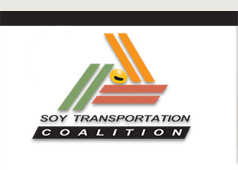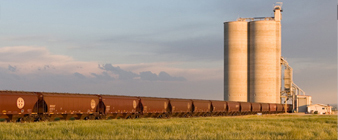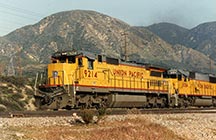 |
 |
|
| eNews • June 2014 | ||
| Promoting a Cost-Effective, Reliable and Competitive Transportation System |
||
 Slower BNSF Intermodal Transits Give UP Opening
Slower BNSF Intermodal Transits Give UP Opening
Union Pacific Railroad appears to be taking advantage of shippers’ frustrations with BNSF Railway service between the Pacific Northwest and Chicago - one of the busiest North American intermodal lanes - by launching its own service between Portland and Chicago.
Increased traffic on the rails, including non-intermodal shipments tied to the domestic oil and natural gas boom, coupled with healthy volumes of agriculture, has slowed intermodal traffic on BNSF Railway’s services from Seattle and Portland to Chicago. BNSF’s expedited intermodal service from Seattle to Chicago used to take about 84 hours, said Tom Finkbiner, a noted intermodal consultant. Now, the transit time for an expedited trailer or container to hit the Midwest hub from Seattle is closer to 120 hours, according to BNSF service goals released on May 2. Service goals show customers cut-off times for shipments and the estimated time it will take to ship to various destinations. The transit for expedited containers and trailers from Portland to Chicago now takes about 135 hours, according to BNSF service goals.
The apparent increase in BNSF transit times between the Pacific Northwest and Chicago is the latest sign that a backlog of carload freight - caused by severe winter weather and an uptick in volume, much of it tied to the domestic energy boom - is impacting intermodal service. During a U.S. Surface Transportation Board hearing last month on deteriorating rail service, BNSF Chief Marketing Officer Steve Bobb said the railroad twice this year moved 2,000 intermodal shipments a week, a high not reached since 2009.
BNSF declined to comment on the historical average transit times for both routes, saying it was competitive information. The railroad did, however, say it has created new schedules for intermodal service in the Pacific Northwest, following higher traffic on the lanes and expectations of more growth to come.
“We are managing for the growth we are experiencing now, and we are investing to improve service for all of our customers and manage our network to provide service that meets our customers’ expectations,” said BNSF spokesman Amy Casas, pointing to the railroad’s $5 billion capital investment plan for this year. About $1 billion of that will go toward improving and expanding capacity along the Northern Corridor, a chokepoint for export agricultural traffic, as well as shipments tied to domestic energy production in the Bakken formation.
UP on May 8 will begin a domestic intermodal service between Portland and Chicago that takes 77 hours on the eastbound leg and 81 hours coming back, UP spokesman Aaron Hunt said. The service, which will include trains moving westbound six days a week and trains hauling goods eastbound five days a week, is in addition to another UP intermodal service between Portland and Chicago.
Although UP service has also slipped in recent months, the railroad doesn't have a network chokepoint like that of BNSF because it’s less tied to the domestic energy sector. BNSF has also seen a sharper uptick in freight growth since the recession, with the railroad saying it handled about half of the U.S. rail industry's total growth since the recession.
The Northwest-Midwest lane was the fifth biggest intermodal lane in the first quarter, accounting for about 9 percent of traffic of the top seven lanes. Intermodal traffic from the Northwest to the Midwest in the first quarter fell 16.5 percent year-over-year to nearly 126,000 units, while volume in the opposite direction dropped 6.3 percent in the same period to about 99,000 units, according to Intermodal Association of North American statistics.
UP intermodal volume expanded 8 percent in the first three months of the year, while BNSF volume only rose 1 percent.
Source: Journal of Commerce
Soy Transportation Coalition |
|
